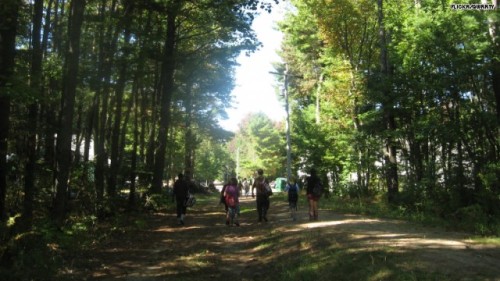Act Like a Slave?
Share
Explore Our Galleries
Breaking News!
Today's news and culture by Black and other reporters in the Black and mainstream media.
Ways to Support ABHM?
By Jamil Smith, Tv.Msnbc.com
When James Baker heard the words “Nature’s Classroom” in reference to the Massachusetts location of his 12-year-old daughter’s forthcoming four-day field trip, he thought she and her fellow students would “just be going to learn what side of the tree moss grows on.” Instead, as he and his wife Sandra described Sunday on Melissa Harris-Perry, his daughter was terrified by the slavery re-enactment she and her classmates had participated in during the last day of the trip.
News of the activity came as a shock both to Sandra Baker—and according to her, the students themselves.
“They spent three days having fun before they even brought the kids to the field to do the experiment,” Baker told Harris-Perry. “The kids had no indication this was going to happen. They surprised them.”
According to testimony the Bakers offered in conjunction with their human rights complaint filed last week with the Hartford Board of Education, their daughter said that she was packed together with other students in a dark room to simulate being on a slave ship and hiding in the woods from their “white masters,” and instructors told her things such as “We don’t need any sick slaves. If you get sick, we will throw you overboard.” The 12-year-old was told to play a slave in the Underground Railroad, and heard things like “n*gger, if you can read, there is a problem,” “Dumb, dark skinned Negro person, how dare you look at me?”
Nature’s Classroom offered a lengthy online statement explaining that the organization first developed the Underground Railroad activity “about 20 years ago.” Harris-Perry argued that schools would never permit students to learn about rape or the September 11 attacks by re-enacting them. Khalil Muhammad, director of the Schomburg Center for Research in Black Culture in Harlem, offered the example of the United States Holocaust Memorial Museum as a way to illustrate historical horror effectively, yet without the emotional trauma associated with the actual experience, and cited the Schomburg Center’s recent course for young people at a pace appropriate for each age level. (…)
“It’s built into our DNA, this contrasting metaphor between liberty and slavery,” Muhammad said on Sunday’s MHP. “But also the economic footprint of slavery made America the wealthiest nation in the world, and shortened the time for that development. So we’ve got to start dealing with the importance of slavery from the very beginning…it can’t be some random Wednesday on some random field trip where all of a sudden, you drop down and you’re in the middle of the Underground Railroad reenactment.” (…)
To catch the full story, click here.
For more breaking news, click here.











Comments Are Welcome
Note: We moderate submissions in order to create a space for meaningful dialogue, a space where museum visitors – adults and youth –– can exchange informed, thoughtful, and relevant comments that add value to our exhibits.
Racial slurs, personal attacks, obscenity, profanity, and SHOUTING do not meet the above standard. Such comments are posted in the exhibit Hateful Speech. Commercial promotions, impersonations, and incoherent comments likewise fail to meet our goals, so will not be posted. Submissions longer than 120 words will be shortened.
See our full Comments Policy here.